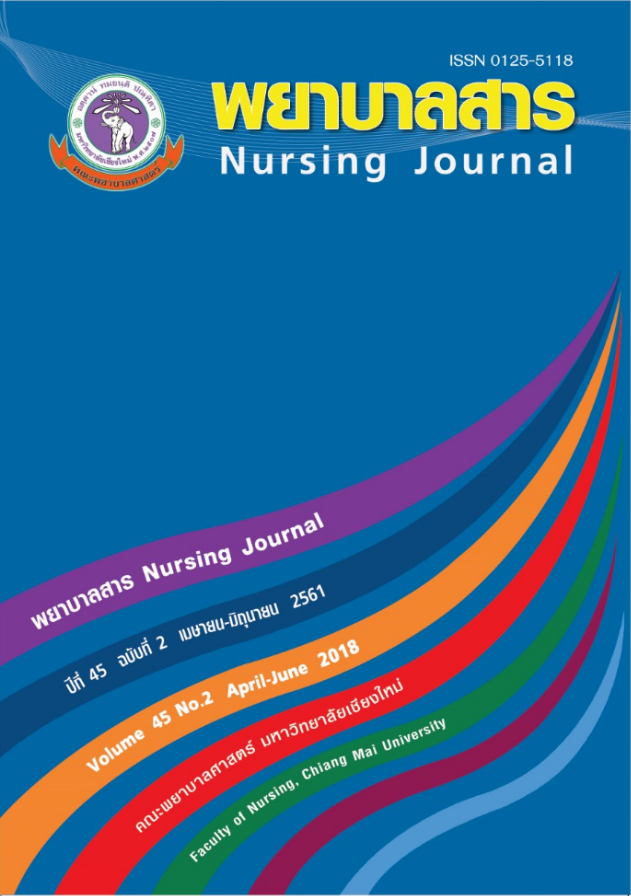The Effectiveness of the Life Skill Promoting Program and Family Participation on Life Skills Development and Intention to Quit Using Illicit Drug Among Juvenile Under Supervision by the Venue of Youth Observation and Protection
Keywords:
Life skills development, Intention to quit using illicit drugs, Life skills promotion programAbstract
Juvenile detainees who are on illicit drug abuse and who are under the supervision of the Venue of Youth Observation and Protection should obtain proper life skills training before they are released. This can help in preventing them from returning to illicit drug abuse. This quasi experimental study is to explore the effectiveness of the life skill promoting program and family participation on the life skills development and intention to quit using illicit drugs among juvenile detainees who are under the supervision of the Venue of Youth Observation and Protection. Study participants included 42 juvenile detainees along with their 42 guardians for a total of 84. They were divided into 4 groups, each group composed of 20-24 participants (one juvenile detainee paired with one guardian). Each group participated in the program twice, one week at a time, and each time, lasted 2 hours. The program offered 8 activities including: relationship building activity, activity on the danger of illicit drug use, activity on the pathway to quit drugs, activity on sharing with other drug abusers, self-discovery activity, family and return to drug addiction activity, family strengthening activity, and goal setting activity. The data were collected before and after the implementation of the program in order to make a comparison. The instrument was self- administered questionnaire composed of 2 parts: life skill development and the intention to quit drugs. The data were analyzed using descriptive statistic and dependent t-test.
The results showed that after the program implementation, the average scores of life skills development in all aspects and the intention to quit drugs were statistically significantly greater than those before the program implementation (p <0.01). The important factor that supported these outcomes was the group activity along with family member participation. Participants were given the chance to share and discuss, especially on area of support from the family members enhanced family members’ relationship and understanding. The intention of which is to develop self-sufficient life skills to prevent drug use. And intend to not go back to drug repetition.
References
กรุงเทพมหานคร : กระทรวงยุติธรรม.
โกศล อินทวงค์.(2550). การพัฒนารูปแบบการเรียนรู้ในการป้องกันและแก้ไขปัญหายาเสพติดในสถานศึกษาสังกัด
สถาบันอาชีวศึกษาภาคตะวันออก. กรุงเทพมหานคร : มหาวิทยาลัยรามคำแหง.
ชวันรัตน์ เสถียรกิตติ์ธนา. (2556). ผลของโปรแกรมการฝึกทักษะชีวิตแบบบูรณาการโดยครอบครัวมีส่วนร่วมต่อ
พลังต้านการเสพยาบ้าของผู้เสพยาบ้าที่ได้รับการบำบัดในระยะฟื้นฟูสภาพ. (วิทยานิพนธ์พยาบาล
ศาสตรมหาบัณฑิต). บัณฑิตวิทยาลัย, จุฬาลงกรณ์มหาวิทยาลัย.
ดารกา แสงสุกใส. (2558). EQ ความฉลาดทางอารมณ์ในวัยรุ่น.กรมสุขภาพจิต. สืบค้นจาก
http://www.dmh.go.th/166721667view.asp?id=3928.
ธิราภรณ์ สายอ้าย. (2551). การมีส่วนร่วมของชุมชนในการรณรงค์ป้องกันและแก้ไขปัญหายาเสพติดในอำเภอ
แม่ทะ จังหวัดลำปาง. (วิทยานิพนธ์พยาบาลศาสตร์มหาบัณฑิต สาขาการพยาบาลชุมชน). บัณฑิต
วิทยาลัย, มหาวิทยาลัยเชียงใหม่.
นุรินยา แหละหมัด, อ้อมเดือน บุญญามณี, ดารารัตน์ สาธรพันธ์, และสยาม มุสิกะไชย. (2552). การมีส่วนร่วม
ของครอบครัวในการดูแลผู้ป่วยยาเสพติดขณะบำบัดรักษาในศูนย์บำบัดรักษายาเสพติดสงขลา. สืบค้น
จาก www.sdth.in.th/upload/forum/09.pdf.
ปฐมามาศ โชติบัณ, และอมร วัฒนธีรางกูร. (2551). การจัดการความรู้ของวิทยาลัยพยาบาลบรมราชชนนี
สงขลา. สงขลา : วิทยาลัยพยาบาลบรมราชชนนีสงขลา.
ปิยวรรณ สารมาส. (2556). ผลของโปรแกรมสร้างแรงจูงใจภายในร่วมกับการสนับสนุนจากครอบครัว ต่อความตั้งใจ
ในการลดการกลับไปเสพซ้ำของผู้ผ่านการบำบัดยาเสพติดในคลินิกบำบัดยาเสพติดโรงพยาบาลสมเด็จพระ
ยุพราชเลิงนกทา อำเภอเลิงนกทาจังหวัดยโสธร. (วิทยานิพนธ์สาธารณสุขศาสตรมหาบัณฑิต). บัณฑิต
วิทยาลัย, มหาวิทยาลัยมหาสารคาม.
วิโรจน์ วีรชัย. (2556). สถิติบำบัดยาเสพติดทั่วประเทศไทย. สืบค้นจาก http:// www2. manager.co.th/Around/
ViewNews.aspx?NewsID=9560000081090.
ศาลเยาวชนและครอบครัวกลาง. (2556). รายงานสถิติคดีของศาลทั่วราชอาณาจักร ประจำปี พ.ศ.2556.
กรุงเทพมหานคร : สำนักงานศาลยุติธรรม.
ศุภร ชินะเกตุ. (2553). ปัจจัยที่ส่งผลต่อพฤติกรรมป้องกันยาเสพติดของนักเรียนระดับประกาศนียบัตรวิชาชีพสังกัด
อาชีวศึกษาจังหวัดราชุรี. (วิทยานิพนธ์ศึกษาศาสตรมหาบัณฑิต). บัณฑิตวิทยาลัย, มหาวิทยาลัย
ศิลปากร.
สำนักงานคณะกรรมการป้องกันและปราบปรามยาเสพติด. (2555). สถิติการบำบัดรักษาผู้ป่วยยาเสพติด. สืบค้น
จาก http://nctc.oncb.go.th/new/index.php? Option= com_content & view=article&id.
สำนักงานคณะกรรมการป้องกันและปราบปรามยาเสพติด. (2557). การป้องกันอาชญากรรมและความยุติธรรมทาง
อาญา. สืบค้นจาก http://nctc.oncb.go.th/ new/index php?option=com_content & view= article&id.
สำนักบริหารการสาธารณสุข. (2558). ระบบรายงานระบบติดตามและเฝ้าระวังปัญหายาเสพติด (บสต.). กรุงเทพ
มหานคร : สำนักปลัดกระทรวงสาธารณสุข.
Botvin, G.J., & Griffin, K.W. (2004). Life skill training: Empirical findings and future directions. The Journal
of Primary Prevention, 25(2), 211-232.
Kaufman, E., & Brook, D.W. (2004). Family involvement in early childhood education. Retrieved from
www.hfrp.org/content/download/1181/.../earlychildhood.
Kleiman, M.A.R., & Hawdon, J.E. (2011). Encyclopedia of Drug Policy. Los Angeles: SAGE Publication.
Translated Thai Referance
Department of Observation and Protection of Children and Youth. (2013). Information for children and
youth prepared before let go back to repetition. Bangkok : Ministry of Justice.
Intavong K. (2007). Development of a learning model for preventing and solving drug problems in
Educational institutions Vocational Institute of Eastern Region. Bangkok : Ramkhamhaeng
University.
Sathienkittana C. (2013). The effect of family-based integrated life skills training program. The anti-
amphetamine drugs of amphetamine addicts treated during rehabilitation. (Master of Nursing
Thesis). Graduate Studies, Chulalongkorn University.
Sangsugsai D. (2015). EQ Emotiona l intelligence in adolescence. Department of Mental Health.
Search from http://www.dmh.go.th/166721667view.asp?id=3928.
Sayaiy T. (2008). Community participation in the campaign to prevent and solve drug problems in
Mae Tha district, Lampang province. (Master of Nursing Thesis Community Nursing).
Graduate School, Chiangmai University.
Laemud N., Boonyamanee O., Sathonpun D., & Musikachi S. (2009). The family of drug addiction
treatment in drug treatment center in Songkhla. Search from www.sdth.in.th/upload/
forum/09.pdf.
Chotibun P., & Wattanatherangkul A. (2008). Knowledge management of Boromarajonani College of
Nursing, Songkhla. Songkhla : College of Nursing Boromarajonani, Songkhla .
Saramas P (2013). The Effects of Internal Motivation Program with Family Support. Towards the intention
to reduce the recurrence of drug addicts in the drug rehab clinic, King Mongkut's Hospital
Yupper Leng Nok Tha District, Yasothon Province. (Master of Public Health Thesis). Graduate
College, Mahasarakham University.
Weerachai v. (2013). Statistics on drug treatment in Thailand. Search from http:// www2. manager.
co.th/Around/ ViewNews.aspx?NewsID=9560000081090.
Central Youth Court. (2013). Report on the case law of the Kingdom of Thailand for the year 2013.
Bangkok : Office of the Judiciary.
Chinaket S. (2010). Factors Affecting Narcotics Prevention Behavior of Students at Diploma Level.
Vocational Education in Ratchaburi province. ( Master of Educatio thesis). Graduate School,
Silapakorn University.
Office of the Narcotics Control Board. (2012). Statistics on treatment of drug addicts. Search from
http://nctc.oncb.go.th/new/index.php? Option= com_content & view=article&id.
Office of the Narcotics Control Board. (2014). Crime Prevention and Justice Criminal. Search from
http://nctc.oncb.go.th/ new/index php?option=com_content & view= article&id.
Office of Public Health Administration. (2015). Reporting system monitoring and surveillance drug
Problems (Drug treatment). Bangkok : Office of the permanent Secretary, Ministry of Public
Health.
Downloads
Published
How to Cite
Issue
Section
License
บทความที่ได้รับการตีพิมพ์เป็นลิขสิทธิ์ของวารสารพยาบาลสาร
ข้อความที่ปรากฏในบทความแต่ละเรื่องในวารสารวิชาการเล่มนี้เป็นความคิดเห็นส่วนตัวของผู้เขียนแต่ละท่านไม่เกี่ยวข้องกับมหาวิทยาลัยเชียงใหม่ และคณาจารย์ท่านอื่นๆในมหาวิทยาลัยฯ แต่อย่างใด ความรับผิดชอบองค์ประกอบทั้งหมดของบทความแต่ละเรื่องเป็นของผู้เขียนแต่ละท่าน หากมีความผิดพลาดใด ๆ ผู้เขียนแต่ละท่านจะรับผิดชอบบทความของตนเองแต่ผู้เดียว






